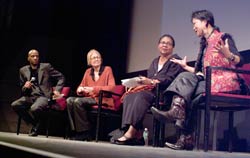Feminists On Film: Gloria Steinem and friends discuss women in the movies
From Uma Thurman as a revenging revenant in Kill Bill to Janet Jackson's "wardrobe malfunction" during the Super Bowl halftime show, media images of women continue to play a powerful role in shaping popular culture. To feminists Gloria Steinem, bell hooks, and Hyun Kyung Chung, however, that is all too rarely a good thing.
Steinem, Hooks, and Chung spoke to a near-capacity crowd at Columbia University's Miller Theatre on November 3 as part of "Bodies In Motion: Images of Women in Contemporary Film & Video." The event was the latest in Project Citizen, a series of academic discussions in talk show format developed by TC doctoral student Kelvin Sealey and his advisor John Broughton, Associate Professor in Psychology and Education. With countless video clips at the panelists' disposal and roving microphones canvassing the audience, Project Citizen used the medium of Geraldo, Oprah and Jenny Jones to create an experience far more interactive than a standard academic lecture.
Steinem is one of the most famous names in modern feminism. She has been involved in the movement for nearly 50 years, and was the first editor of Ms. magazine. First gaining fame for going undercover to investigate the working conditions of Playboy Bunnies, she is a prolific journalist and the author of the book Outrageous Acts, Everyday Rebellions.
Hooks, Distinguished Professor of English at City College in New York, has written on a wide array of topics, from race to gender to the significance of media for contemporary culture.
Chung is Associate Professor of Ecumenical Theology at Union Theological Seminary and lay theologian of the Presbyterian Church of Korea. She is an expert on feminist and eco-feminist theologies and spiritualities from Asia, Africa and Latin America.
Much of the discussion during "Bodies in Motion" was framed by the outcome of the recent U.S. presidential race, which Senator John Kerry had conceded to President Bush only hours before. "Why does it happen again?" asked Chung, who called George W. Bush "the most violent, woman-hating president in [American] history."
Even Michael Moore's Fahrenheit 9/11, which Steinem lauded as marking the rebirth of the political documentary, wasn't spared from criticism. Steinem said that the film presented a mother in a way that made her seem ignorant, "sending her son off to war with no idea that he might get killed."
Other films that might seem on the surface to empower women, such as the femme fatale-driven Kill Bill, were castigated for perpetuating denigrating stereotypes. Lucy Liu's character is a modern update of the sexualized, irrational Asian Dragon Lady image, Chung said. Steinem issued a call for "real images [of women]...something that has some depth to it." She said she would like to see a female-focused movie with the emotional depth of The Motorcycle Diaries, the recently released movie about the young Ché Guevara.
In addition to an extensive question-and-answer period, all of the panelists stayed for more than a half-hour to meet with individual audience members.
"Bodies in Motion" follows a similar forum held in the spring with Cornel West, Professor of Religion and African-American Studies at Princeton University. However, the concept of Project Citizen is rapidly evolving. Sealey's goal is to hold Project Citizen events at a series of college campuses; to cue discussions not only to film but also to television content, video and video games, music and the Internet; and ultimately, to package the various shows for viewing on cable or public television. He also hopes to develop a similar series for high school and middle school audiences, and to involve students in the production process.
Published Friday, Nov. 12, 2004
